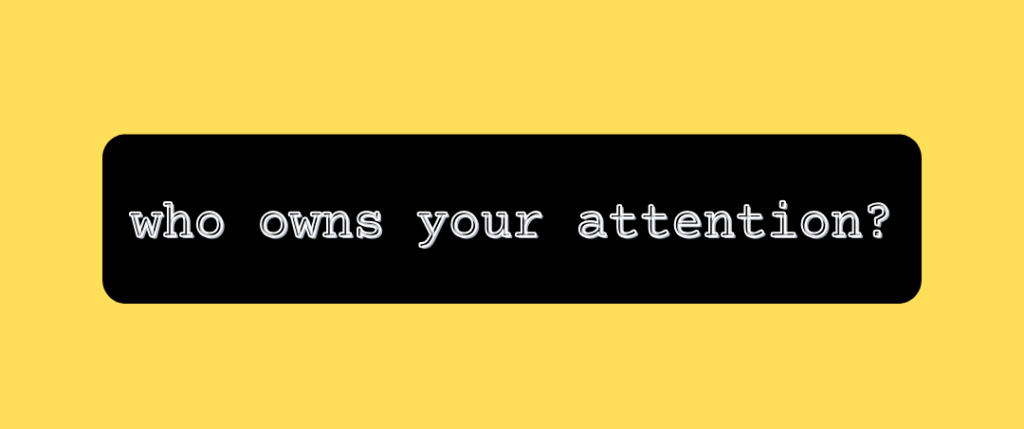From the Aftermath of the Los Angeles Fire Storms.

“Be your own algorithm.” Imprinted on 70s era Dymo embossed tape, that slogan pops up in the promo reel at our local nonprofit movie theater, Vidiots. A place dedicated to both art and creating community, I’m thrilled this gem moved into my neighborhood just in time to help me process . . . . ::gestures wildly:: . . . whatever is happening right now.
We go to Vidiots for creative therapy a lot, so much that I’d begun to tune out that promo reel. Until, that is, we sat in the darkened theater one evening last January as winds howled outside. We’d come to see The Porcelain War, a documentary by three artists (and their dog) torn between making art and making war to defend their homeland from Russia’s violent invasion. Two of those artists, Slava Leontyev and Anya Stasenko, and their dog, attended the screening and shared their personal reflections after the film. The angry roar just outside the theater walls provided an apt “it’s dangerous to be here” ambiance for their harrowing tale.
This was January 7, 2025, the day after Congress certified the election of our new king President— and also the day that 100 mph winds began shooting fire across a neighboring community, incinerating everything in sight. We did not yet know the extent of devastation that either the second Trump administration or the gale force winds might wreak, but the horrors of Russia’s unprovoked invasion into Ukraine felt particularly relatable.
In that milieu, the familiar “Be Your Own Algorithm!” tagline seemed formed of new words. Like the difference between hearing “break a leg” before going on stage versus before sky diving.
Back at home, as many in our city were fleeing the inferno with nothing but their lives, we debated what to do. The nearest area under evacuation order was a few miles away, but who knows what could happen while we sleep? Should we pack now or sleep while we can? As if we could. Well, one of us always falls asleep when his head hits the pillow, while the other of us assumes the posture and frets.
We woke in a frigid darkness, the power and heat having gone out, the moment I finally drifted off. The area covered by the nearest evacuation order had grown but still did not include us. I packed and re-packed our bags. I prepped cat carriers for loading. I moved food from the fridge to the deep freezer. I texted friends to check on their safety, their plans, and their well-being. I distracted the three cats with catnip to take their worried attention off that stack of carriers at the front door. Though we had backup batteries, I restricted use of my phone to essential communications obtaining and gathering intel, just in case.
I did what mattered most in that moment. That’s when I began to be my own algorithm.
When we realized we’d been spared the worst, I cried my prayers of gratitude, walked around my home touching precious belongings, giving thanks for our embarrassment of riches. But the urge to resume doomscrolling was great, like the lure of a glass of water in the Atacama desert in northern Chile (some parts have not seen rain in centuries). Which makes me parched, just to write.
But I thought of the determination of those Ukrainian artists, I resolved to purge all that had been stealing my attention from knowing what matters most. I deleted my beloved Threads app, and its heartwarming but also time-sucking stories. I purged the Bluesky app with some hesitation, because it’s a site where I read from trusted journalists. But guess what? I can read their columns and articles on actual news sites.
I kept Facebook and Instagram, much to the dismay of my inner moral purist, but it’s where I connect with local businesses, faraway friends and family. Instead, I set rules for my engagement. None earthshattering, but each decision made with intention. Cost benefit analysis. And concern for my own wellbeing. Reclaiming ownership of my own mind space may be the most revolutionary thing I can do. Well, for someone with my low back, bladder and introvert issues, that is.
I sometimes consider how the fewer choices my grandparents, born more than a hundred years ago, had to make in a day. With just a handful of choices of radio and, later, television stations, food selections choices limited by the season, and household appliances numbering less than ten, I have to wonder. What did they do with their time freed of poring over Consumer Reports to find something that might last, fixing the endless stream of broken stuff, perusing Amazon to find more disposable junk to buy, and studying YouTube videos to figure out how TF to get the bleeping thing to work?
They planted tomatoes and pruned the rose bushes. Studied their gardening and craft magazines. Played cards. Canned pickles and jam. Had friends over for a home-cooked dinner. Sewed doll clothes and crocheted tablecloths. Drank iced tea on the porch. Churned homemade ice cream.
No matter how much I curb my social media and refuse to buy cheap crap I don’t need, I’ll never regain such simplicity in my life, but I sure can take a page from their playbook. What can I do today that will not make a cent for Mark Zuckerburg, Jeff Bezos or Elon Musk? When I think of it that way, giving up shopping or tweeting doesn’t feel like a sacrifice. It feels like subtle-but-resolute subversion. My favorite kind.
